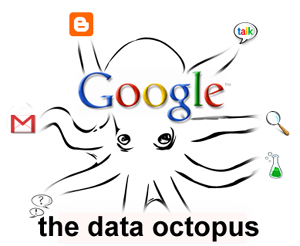Google – the data octopus

Although this post shall be mainly about Google, I will start with another example: Amazon. If you bought a few times at Amazon, you will notice something when you visit their website. They give you recommendations on what to buy next. And most of the time this recommendations are pretty good, most of the time you would really like to own one of the products they recommend.
And probably everyone nowadays knows how they do it. They track everything a user does, from simple browsing, over searches to purchases and put together a profile of each customer or visitor. They compile a really huge database out of this pieces of information. And then they link this pieces together. The process is called “Data Mining“.
An Example: with the help of fancy algorithms and statistical analysis techniques they discover: 100 people bought the latest album by “The Killers”. 15% of those people also bought the latest album by “The Strokes”. So they reason if you bought the latest Storkes album you might also be interested in the Killers album.
This is of course only a very simple example as it only includes 2 features. Considering how many visitors, purchases and products Amazon has.. well. The data they have at their disposal should be quite good. By now they have probably a profile of every single one of us. Although you never bought anything at Amazon, your profile might just be in their database. Humans are not so different.
And what about Google? Do they create profiles of their users too? Hell yes. And the data they can gather from their users might be even better. Here’s a (incomplete) list of services Google offers and my ideas of what data they could gather from that.
- Search:
They analyse the keywords you type in, the search results you click and the sponsored links (ads) you click upon. They get a really huge profile of your search habits if you use the Personalized Search Service. Also if you have a personalized homepage all keywords may be tracked back to you. - Gmail:
Obviously: they scan your e-mails for keywords to put together ads. They can get a pretty good idea of what you’re interested in and of what you’re doing by reading your e-mail. - Personalized Homepage:
They know what gadgets you include in your personalized homepage. This also gives them a pointer on what you are interested in. Are you a software developer, politically interested, interested in finances, are you a democrat or a conservative? They may find that out. - Google Reader:
They know: what feeds you like, how regularly you read the feeds, what feeds you read most, how much time you spend reading newsfeeds. And they make no secret of it: Check out this article from their blog. - Google Talk:
That in conjunction with Gmail is their greatest source for social information. They know who you’re friends with! They also know how much time you spend in front of your computer. - Google Groups and Blogger:
They know what topics you’re interested in in terms of newsgroup discussions or blog comments (if the blog you comment on is hosted by Blogger).
Now don’t get me wrong. I’m not a fanatic Google hater. As a matter of fact I use some of the mentioned products myself (including Gmail which is probably the worst in terms of privacy) however I think it’s important for people to be aware of what can be done with their data. And yes, I’m aware of the irony that this blog is powered by Blogger.
No Comments
Sorry, the comment form is closed at this time.